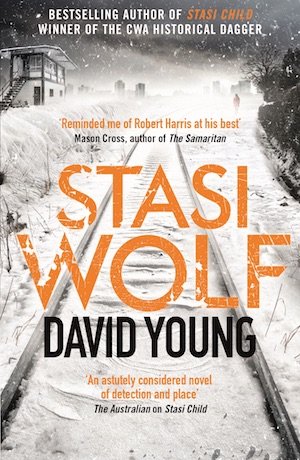
At the end of Stasi Child, we left Oberleutnant Karin Müller widowed and disgraced rather than triumphant after solving a tricky case with political repercussions. Stasi Wolf opens a few months later, and Karin’s career seems permanently stalled, all because she refused to join the Stasi. But then she is given another chance. In the brand-new purpose-built town of Halle-Neustadt, pride of the German Democratic Republic, a pair of newborn twins have gone missing. The local authorities seem keen to draft in police from Berlin to handle the case, with considerable supervision from the secret police. Karin is understandably reluctant to take it on and run the risk of clashing with the Stasi again. She doesn’t have much choice, however, so she heads south to the half-finished city with no street names, only sector numbers.
Why are the police so desperate to keep the whole investigation under wraps, keeping the public blissfully ignorant of any danger? Is it merely to avoid tarnishing the reputation of the model communist city and keep the population from panicking, as they claim, or is there something more at stake? And how is Karin supposed to solve a crime when her team are not allowed to ask any questions? Although she has managed to get her former partner Werner Tilsner to join the team in Halle-Neustadt and the two of them engage in their own brand of creative lateral thinking, the investigation soon gets bogged down in secrecy and propaganda.
Alongside the 1975 timeline, we also have a second timeline starting in 1965, told from the perspective of a rather child-like woman called Franzi. As she describes her marriage, her husband’s mysterious but very important job, and their attempts to have children, it will become rather obvious to you why these passages have a bearing to the case Karin is investigating, although the full details only become apparent in the final pages. There is also quite a bit of Karin’s own back story in this book, since Halle is not far from her parents’ home in the Thuringian forest, and she begins to find happiness with a new partner. The multiple shifts in timeline and point of view can become slightly confusing, and there are perhaps a few too many implausible connections between them. You might also wonder about the feats of superhuman strength one of the protagonists carries out towards the end.
There is little to fault in the author’s masterly recreation of the claustrophobic atmosphere and all-pervasive sense of suspicion, typical in any totalitarian state. The tone and feel of everyday life in the GDR is pitch-perfect, from the Wartburgs and S-Bahns to the Vita Colas and lengthy party meetings in the workplace. The author has been very diligent about doing his research and many of the least believable plot details are based on true facts, as you will discover if you read the afterword. The dialogue is full of tension, nearly always full of hidden menace and double speak, and each of the characters has learnt not to take anything at face value.
Although I didn’t enjoy this quite as much as Stasi Child, book two is intriguing and the series remains unlike any other that is currently out there. I can’t wait to see what the Oberleutnant will be up to next.
For books in a similar vein, try the outstanding Arkady Renko series by Martin Cruz Smith. Stasi Wolf is released 9 February.
Zaffre
Print/Kindle/iBook
£3.99
CFL Rating: 4 Stars